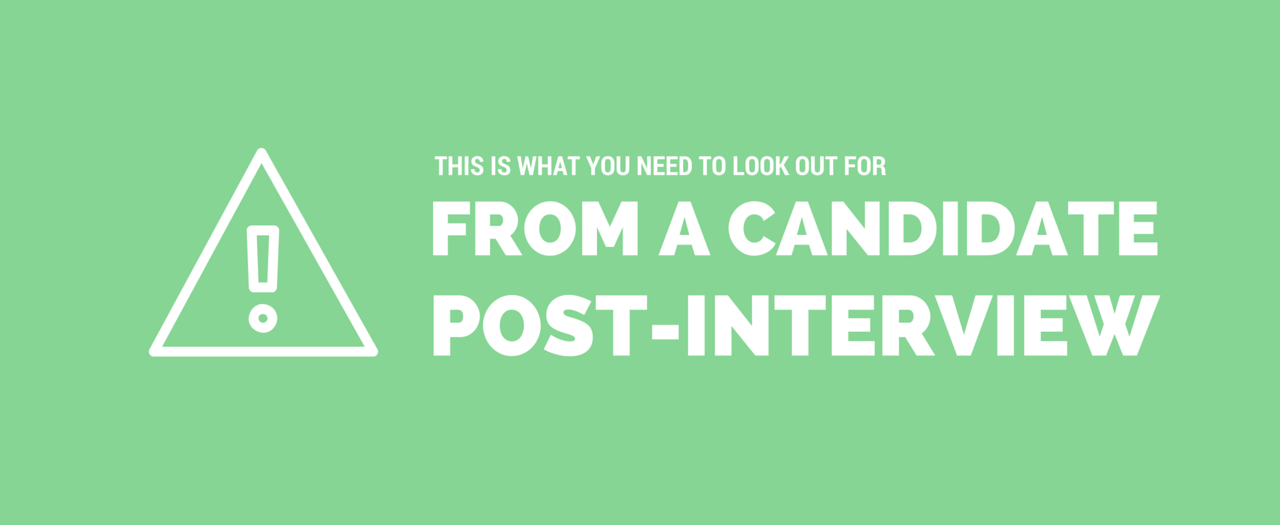As any seasoned recruiter or hiring manager would tell you, the hiring process is about a lot more than the interview. While the interview is a great chance to really start to get to know a candidate, what job seekers do afterwards can be just as important. Everything from the questions they ask to the post-interview thank you note is full of information about what type of employee they would be.
But exactly what behaviors are good signs?
We asked some hiring experts about their thoughts on what the best candidates do — and don’t do — after the interview. Here’s their advice:
The red flags to look for
1. Not asking the right questions
The worst mistake somebody could make immediately following an interview is to NOT ask return questions at the conclusion. Really? We just spent an hour asking you forty or so questions. You have nothing on your mind? You’re not interested about your day-to-day duties? What about the company dynamic? What about the people who you will work with? People who don’t ask questions in an interview show me that they just want a job – not this job. They want to come to work for eight hours a day, get paid, and leave. I need to be shown that this person cares about the role and will eventually care for their work and the company.

Sebastien Dupéré, President and CEO, Dupray
2. An impersonal note
Red flags in a thank you note are not using the interviewee’s name in the salutation, a lack of a specific reference to the interview discussion, and over-promoting oneself. Another obvious one would be grammatical mistakes.

Marcelle Yeager, President, Career Valet
3. Too much negativity in the note
There are a couple red flags that a candidate might include in a thank you note that should make an employer think twice about hiring them. Being too self critical or apologizing for parts of the interview that the candidate felt they were weak in will show a lack of confidence and a sign of desperation. Also pointing out anything negative about their current or previous employer. The best thing to do to set yourself apart is to send a personalized thank-you note or follow-up email that highlights skills and qualifications relating to the position.

Tiffany Brown, HR Manager, FreightCenter
4. Overstepping boundaries
No matter how chummy the conversation got in the interview, the thank you should always be professional and respectful — no slang, poor grammar, etc. They should also show confidence, but not project assumptions that they already have the position (unless they were given an offer on the spot). Even worse, a bad candidate will not do any follow-up at all — that shows lack of interest and/or unprofessionalism.
Lois A. Krause, HR Consultant, KardasLason
The signs you have a keeper
1. Asking the right questions
Having consulted on a great many hires, I have to say my favorite post interview sign that the candidate is a keeper comes the minute the interview is over and we ask if the candidate has any questions. The best questions show not just an interest in the job but an interest in helping the company accomplish its goals. Like “What would the perfect employee for this job look like for you?” or “In the best of all possible worlds, what would you like me to accomplish for you? In three months? In a year? In five years?” This works even better if, in responding to the answers the interviewer gives, the applicant demonstrates all the research he or she has done about the company.

Barry Maher, author and speaker, Barry Maher & Associates
2. Going beyond thank you
I would place less emphasis on the note itself and the contents of that note. Rather than a note, perhaps send me an article, a piece of research, or something that relates to our business and current trends. Or something that ties to the content of the discussion in the interview to show that the candidate is engaged and in tune with what is going on. I pay very little attention to what people say moreover to what they do. Are they taking the time to research and stay up-to-date with helpful information that can help them in their career and help move our business forward?

Bryan Clayton, CEO, GreenPal
3. Connecting on social media
Besides a thank you note, other things that a candidate can do to set themselves apart post-interview in a positive way is to follow the company and engage with it on social media outlets like Twitter and LinkedIn. Sending a follow-up article on a topic of discussion and mentioning [they] thought it would be of interest. This shows [they] are serious about the commitment [they] are making and [their] passion for a career in the field and with your company in particular.

Lori Malett, President, Hatch Staffing Services
4. Knowing when it’s appropriate to ask for updates
Staying vigilant, but not overbearing. Not often, but sometimes, a company is testing a candidate by not sending messages. If a candidate has yet to hear from a company, the candidate should send a few periodic emails to see if he/she is still being considered. But, nothing too crazy!

Josh Goldstein, Co-founder, Underdog
—
What are some other red flags that should make you rethink a candidate? Share in the comment below!












